Business
AFDB REAFFIRMS $2.2 BILLION PLEDGE AS VP SHETTIMA COMMISSIONS 2ND SAPZ IN CROSS RIVER ** Says agro-industrial processing zones will empower farmers, attract investors, diversify Nigeria’s economy
Published
1 week agoon
By
Ekwutos Blog
STATE HOUSE PRESS RELEASE
AFDB REAFFIRMS $2.2 BILLION PLEDGE AS VP SHETTIMA COMMISSIONS 2ND SAPZ IN CROSS RIVER
** Says agro-industrial processing zones will empower farmers, attract investors, diversify Nigeria’s economy
The federal government has commenced construction of the Special Agro-Industrial Processing Zone in Calabar, Cross River State, as part of a nationwide drive to transform the agricultural sector and stimulate inclusive economic growth across Nigeria.
This is the second of such a facility initiated within 72 hours after Vice President Kashim Shettima had on Tuesday performed the groundbreaking ceremony for the construction of the Kaduna State SAPZ in the Chikun local government area of the state.
Already, the AfDB_Group has reaffirmed its commitment to mobilising an additional $2.2 billion to execute the second phase of the SAPZ project across 28 states in Nigeria.
Speaking on Thursday when he performed the groundbreaking ceremony of SAPZ in Calabar, the Vice President described the project as “a game changer” that aligns with the President Tinubu administration’s Renewed Hope Agenda, aimed at diversifying the nation’s economy, addressing food security, tackling rural unemployment, as well as empowering farmers and the youth population.
“There is no intervention more practical in our dream of a nation where the potential of agriculture is maximised than what’s brought us together today. This isn’t just a project—it’s a bold vision to transform Nigeria’s agricultural value chain,” VP Shettima said.
According to him, the SAPZ initiative, supported with counterpart funding from development partners and the private sector, is designed to address challenges that have long hindered the growth of Nigeria’s agricultural economy, including inadequate processing infrastructure, limited access to markets, and rural unemployment.
“For far too long, our farmers have contended with poor infrastructure, lack of access to finance, and inadequate processing facilities. This zone is designed to confront those challenges head-on by creating an ecosystem where innovation, investment, and collaboration thrive,” he noted.
VP Shettima explained that the Calabar SAPZ will serve as a hub for agro-processing and storage, providing farmers and agripreneurs with critical infrastructure to scale their operations and tap into local and international markets.
“This is where farmers will meet with private investors, where ideas will turn into enterprise, and where our youth will find meaningful opportunities,” he said, disclosing that the Tinubu administration has classified SAPZ as a priority program in Nigeria’s quest for food security, with plans to institutionalize it as a government agency that will facilitate agricultural industrialization across all 36 states.
“These zones will generate thousands of jobs. They will create opportunities for young people, empower them with skills and knowledge to engage in meaningful work and help them contribute positively to the economy. Cross Riverians, development has come to your doorstep. For you and for the country, SAPZ is a game changer—one that will enable Nigeria to diversify its economy with a sustainable source.,” he stated.
Senator Shettima also expressed gratitude to key international development partners, including the African Development Bank, the Islamic Development Bank, and the International Fund for Agricultural Development, for their support and belief in Nigeria’s vision.
The Vice President commended Cross River State Governor, Senator Prince Bassey Edet Otu, for his collaboration, describing him as “a critical foundation for the success of this intervention and a great ally in development.”
Earlier, Cross River State Governor, Senator Otu, said the programme marked a watershed in the ongoing bid by his administration to establish the renewable resource base of the state through the full utilisation of agriculture and its multiple value chain.
Otu pointed out that in Cross River State, the establishment of a cluster of smallholder farmers in cash crops such as rice, cassava, millet, and cocoa across the state is the right step towards the agro-industrial revolution.
He said the paradigm shift from a non-renewable to a renewable resource base also holds the key to the prosperity of many nations, hence the imperative to join the league of sub-nationals in Nigeria that have adopted agriculture as the mainstay of their economy.
“The deliverables of the envisaged projects are food security, diversification of the state economy towards export-oriented trajectory and increase in the State’s GDP. When these projects are fully operational there is an expected robust collaboration with reputable agro-based processing institutes, universities and the rest, aimed at accelerating breakthroughs in many agro-industrial production.”
Also, Minister of Agriculture and Food Security, Senator Abubakar Kyari, said the programme would transform the agricultural production and agro-investment landscape in Nigeria under the Renewed Hope Agenda of President Tinubu.
Kyari thanked Vice President Shettima for his leadership and political backing at the highest level in the implementation of the SAPZ in Nigeria, just as he also commended the Governor of Cross River State for his commitment to ensuring that the state is among the front-running states that will commence the construction of their Agro-Industrial Processing Hub.
In his remark, President of AfDB, Dr Akinwumi Adesina, reiterated the bank’s pledge to mobilise $2.2 billion to execute the SAPZ project in 28 states across Nigeria.
Adesina observed that Cross River State has a significant role to play in Nigeria’s agricultural transformation because of the vast production of cocoa, cassava, rice and banana in the state, saying Obudu Cattle Ranch alone can turn the state into a huge livestock producer.
He also acknowledged that the state is ideal for SAPZ because it has an export processing zone, ports facility, and export handling capabilities, adding that the SAPZ in Calabar can easily be linked to the seaport for the transportation of processed agricultural commodities to the export market in neighbouring countries, including Cameroon and the rest.
“The African Development Bank, as you know, is spearheading this together with our partners, which include the Islamic Development Bank and the International Fund for Agricultural Development, and we have put together $934 million from the African Development Bank, with core financing of $938 million from these partners.
“The first phase of SAPZ in Nigeria will be in eight states of Cross River, Kaduna, Kano, Katsina, Oyo, Ogun, Kwara, Imo and the Federal Capital Territory. We are delighted with our partnership with the Islamic Development Bank and the International Fund for Agricultural Development.
“We have put together a financing package of $510 million to make this work. We expect, in the second phase of this, to mobilise $2.2 billion to be able to work for 28 states across the federation with several partners,” the AfDB President said.
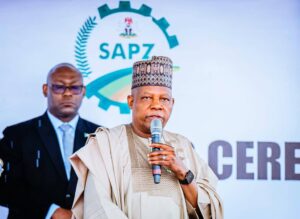

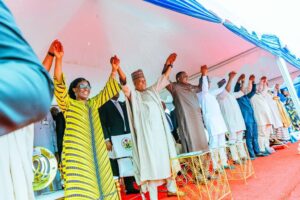
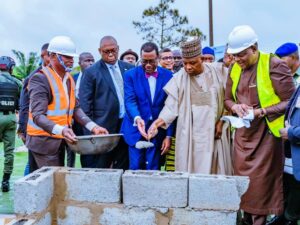

Stanley Nkwocha
Senior Special Assistant to The President on Media & Communications
(Office of The Vice President)
10th April, 2025

You may like
Anambra police arrest 33 yrs old man over Rap!ng teenagers and murder of a teenage boy in Nnewi.
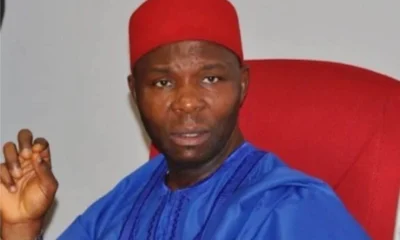

APC suspends Senator Utazi over alleged anti-party activities


Anambra Election: Valentine Ozigbo sues APC, INEC, seeks fresh primary


Nnewi has never produced a governor and the time is now: Ambassador Nwaobi visits Prince Nicholas Ukachukwu in Abuja, discusses political-economic future of Anambra


Police investigate alleged attack on Senator Natasha’s family house


Rivers Crisis: I’m open to forgiveness – Wike gives Fubara condition for peace
Business
IMF: Nigeria will navigate global shocks due to Tinubu’s reforms
Published
12 hours agoon
April 18, 2025By
Ekwutos Blog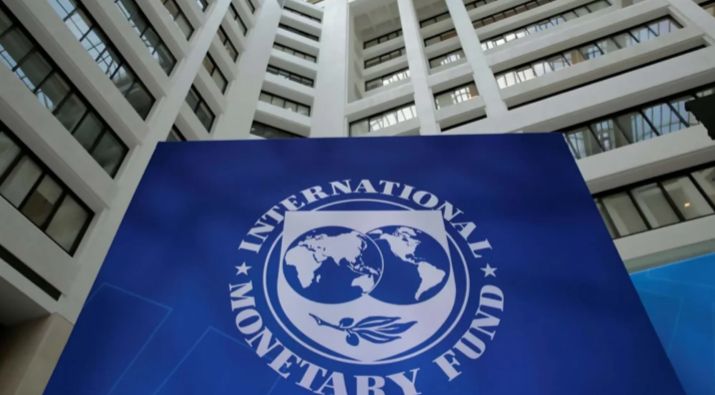
The International Monetary Fund (IMF) says Nigeria will navigate global shocks due to the reforms implemented by President Bola Tinubu.
Axel Schimmelpfennig, IMF mission chief for Nigeria, spoke during a visit to Lagos and Abuja from April 2 to 15, where he led a delegation to hold discussions for the 2025 Article IV Consultations with Nigeria.
The team met with Wale Edun, minister of finance and coordinating minister of the economy; Abubakar Kyari, minister of agriculture and food security; Yemi Cardoso, governor of the Central Bank of Nigeria (CBN); ministry of environment and other stakeholders in the private sector, academia, labour unions, and civil society.
In a statement by the IMF, Schimmelpfennig said authorities had taken “important steps” to stabilise the economy, enhance resilience, and support growth.
The steps, he noted, include ending the CBN’s financing of the fiscal deficit, removing costly petrol subsidy, and improving the functioning of the foreign exchange market.
“The Nigerian authorities have taken important steps to stabilise the economy, enhance resilience, and support growth,” Schimmelpfennig said.
“The financing of the fiscal deficit by the central bank has ceased, costly fuel subsidies were removed, and the functioning of the foreign exchange market has improved. Gains have yet to benefit all Nigerians as poverty and food insecurity remain high.
”The outlook is marked by significant uncertainty. Elevated global risk sentiment and lower oil prices impact the Nigerian economy.
“The reforms since 2023 have put the Nigerian economy in a better position to navigate this external environment. Looking ahead, macroeconomic policies need to further strengthen buffers and resilience, while creating enabling conditions for private sector-led growth.
“The authorities communicated to the mission that they will implement the 2025 budget in a manner that is responsive to the decline in international oil prices.”
‘TIGHT MONETARY POLICY REQUIRED TO CURB INFLATION’
The IMF official also recommended a neutral fiscal stance to support monetary policy in bringing down inflation.
He added that fiscal savings from petrol subsidy reforms should be channelled into the national budget to protect critical investments.
Schimmelpfennig further advised that the CBN maintain a tight monetary policy stance to curb inflation.
“In particular, adjustments should protect critical, growth-enhancing investment, while accelerating and broadening the delivery of cash transfers under the World Bank-supported program to provide relief to those experiencing food insecurity,” he said.
“A tight monetary policy stance is required to firmly guide inflation down.”
Schimmelpfennig said the monetary policy committee’s data-dependent approach has served Nigeria well and will help navigate elevated macroeconomic uncertainty.
Business
PwC exits nine African countries to focus on markets with growth prospects
Published
2 days agoon
April 17, 2025By
Ekwutos Blog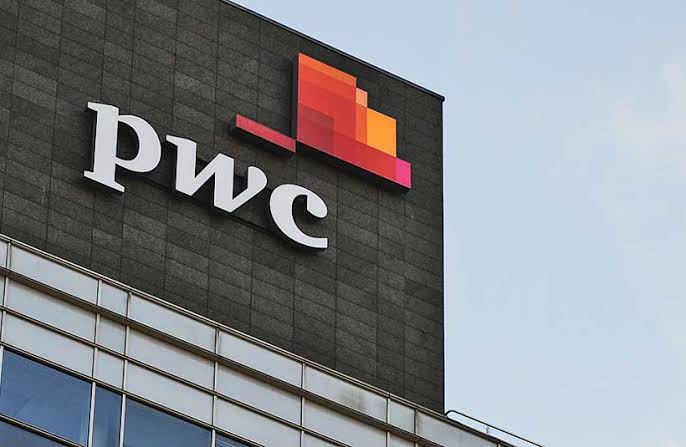
PricewaterhouseCoopers (PwC) has announced the closure of its operations in nine Sub-Saharan African countries.
The affected countries include the Ivory Coast, Gabon, Cameroon, Madagascar, Senegal, the Democratic Republic of Congo, the Republic of Congo, the Republic of Guinea, and Equatorial Guinea.
In a statement on its website, PwC said the decision was part of a broader strategy to concentrate on markets with long-term growth prospects “We remain confident in the long-term growth potential of the continent,” the firm noted, emphasizing continued operations in key markets such as Nigeria, Kenya, and South Africa.
A report by the Financial Times, citing sources familiar with the matter, revealed that revenues in several local markets had dropped by over a third in recent years. The slump reportedly followed directives to sever ties with clients deemed high-risk.
Although PwC did not provide specific reasons for the exits, the firm is also grappling with reputational challenges elsewhere. In Saudi Arabia, for instance, the country’s $925 billion sovereign wealth fund recently halted engagements with PwC. Additionally, the firm has reportedly ended affiliations with member offices in Zimbabwe, Malawi, and Fiji.
Business
Dollar to Naira exchange rate stands at ₦1,600.80 today
Published
2 days agoon
April 17, 2025By
Ekwutos Blog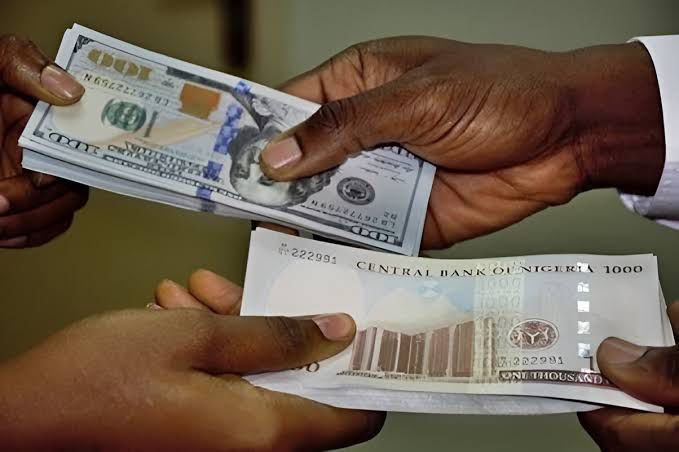
The exchange rate for the US dollar to the naira today is ₦1,600.7991, marking a slight decline of -0.432% compared to yesterday’s rate.
Over the past week, the dollar has shown relative stability against the naira, although it has slipped by -2.094% compared to its value seven days ago.
Within this one-week window, the exchange rate has fluctuated between a high of ₦1,636.71 recorded on April 10, 2025, and a low of ₦1,589.45 on April 14, 2025. The most significant single-day shift happened on April 10, when the naira strengthened, leading to a -2.252% drop in the dollar’s value.
Current Rates:
1 USD = ₦1,600.7991
1 NGN = $0.00062469
US Dollar to Nigerian Naira Conversion Table:
1 USD = ₦1,600.7991
3 USD = ₦4,802.3973
5 USD = ₦8,003.9955
7 USD = ₦11,205.5937
10 USD = ₦16,007.991
12 USD = ₦19,209.5892
15 USD = ₦24,011.9865
25 USD = ₦40,019.9775
30 USD = ₦48,023.973
45 USD = ₦72,035.9595
50 USD = ₦80,039.955
75 USD = ₦120,059.9325
100 USD = ₦160,079.91
300 USD = ₦480,239.73
400 USD = ₦640,319.64
500 USD = ₦800,399.55
750 USD = ₦1,200,599.325
1,000 USD = ₦1,600,799.1
3,000 USD = ₦4,802,397.3
5,000 USD = ₦8,003,995.5
7,500 USD = ₦12,005,993.25
10,000 USD = ₦16,007,991
15,000 USD = ₦24,011,986.5
25,000 USD = ₦40,019,977.5
50,000 USD = ₦80,039,955
75,000 USD = ₦120,059,932.5
100,000 USD = ₦160,079,910
Nigerian Naira to US Dollar Conversion Table:
1 NGN = $0.00062469
3 NGN = $0.00187406
5 NGN = $0.00312344
7 NGN = $0.00437282
10 NGN = $0.00624688
12 NGN = $0.00749626
15 NGN = $0.00937032
25 NGN = $0.0156172
30 NGN = $0.01874064
45 NGN = $0.02811096
50 NGN = $0.0312344
75 NGN = $0.0468516
100 NGN = $0.0624688
300 NGN = $0.1874064
400 NGN = $0.2498752
500 NGN = $0.312344
750 NGN = $0.46851601
1,000 NGN = $0.62468801
3,000 NGN = $1.87406402
5,000 NGN = $3.12344004
7,500 NGN = $4.68516006
10,000 NGN = $6.24688007
15,000 NGN = $9.37032011
25,000 NGN = $15.61720018
50,000 NGN = $31.23440037
75,000 NGN = $46.85160055
100,000 NGN = $62.46880074
Anambra police arrest 33 yrs old man over Rap!ng teenagers and murder of a teenage boy in Nnewi.

APC suspends Senator Utazi over alleged anti-party activities

Anambra Election: Valentine Ozigbo sues APC, INEC, seeks fresh primary
Trending

 Trending6 months ago
Trending6 months agoNYA demands release of ‘abducted’ Imo chairman, preaches good governance
- Business6 months ago
US court acquits Air Peace boss, slams Mayfield $4000 fine

 Politics6 months ago
Politics6 months agoMexico’s new president causes concern just weeks before the US elections
- Entertainment6 months ago
Bobrisky transferred from Immigration to FCID, spends night behind bars
- Entertainment6 months ago
Bobrisky falls ill in police custody, rushed to hospital

 Politics6 months ago
Politics6 months agoRussia bans imports of agro-products from Kazakhstan after refusal to join BRICS

 Politics6 months ago
Politics6 months agoPutin invites 20 world leaders
- Politics1 year ago
Nigerian Senate passes Bill seeking the establishment of the South East Development Commission.
